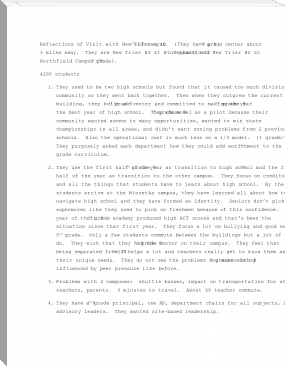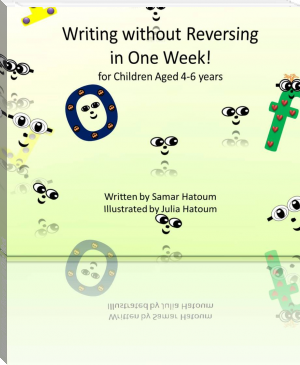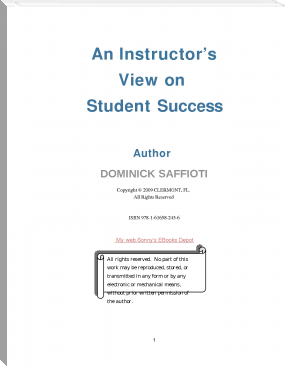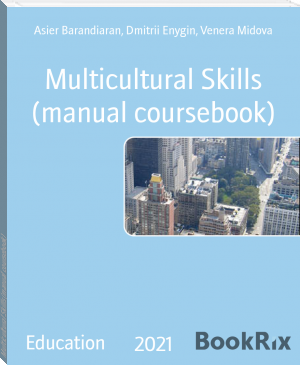Marketing Paper by Michael Leung (ereader with dictionary .TXT) 📕

- Author: Michael Leung
Book online «Marketing Paper by Michael Leung (ereader with dictionary .TXT) 📕». Author Michael Leung
Marketing is a dynamic field that changes with time. Hence, students need to use sources of information that will provide up-to-date information for writing marketing papers. Students write marketing papers such as marketing dissertations, marketing essays, marketing research papers and marketing term papers. It is essential for a student to research on a marketing paper topic before commencing marketing paper writing. Excellent writing skills are essential for quality marketing paper writing. Not all students can write quality marketing papers that will earn excellent grades. Such students result to buying custom-written marketing papers from custom paper writing companies.
A reliable marketing paper writing company has to provide professional marketing paper help. This means that marketing paper writers should have experience and degrees in marketing field. Marketing papers should have substantial facts and information. Hence, marketing paper writers should do a solid research in order to obtain excellent marketing paper information.
Students can buy different types of marketing papers online for instance custom marketing essays, marketing term papers, marketing research papers, marketing dissertations and marketing reports. A reliable company should guarantee the best marketing papers written by the best academic writers. Moreover, it should offer 100% original marketing papers for sale. Writers should custom-write marketing papers according to clients’ requests and specifications. The writers should have sufficient knowledge of the different citation styles used to write marketing papers. Some of the citation styles for writing marketing papers are Harvard, Turabian, Chicago, APA and MLA formatting styles. Students should get custom marketing papers from a company that offers professional help, and shows client-dedication.
There are some writing companies that provide help with marketing paper topics for example the https://essaywriterservices.org/. The sample marketing paper topics include brand markets, marketing strategies, target markets, and many other topics. Students can buy marketing paper topics from a reliable company. This is because some students find it extremely challenging to come up with their own marketing paper topic. Sample marketing papers are also available online. Students should use these sample marketing papers as a guideline to writing their own marketing papers. A reliable marketing paper writing company should guarantee academic excellence. This means that such a company should write the best quality, original marketing papers. Such marketing papers should be written from scratch by experienced and qualified writers. A reliable company should develop marketing paper topics, do an in-depth research on the topics and proofread the custom-written marketing papers. Editing and proofreading of custom marketing papers minimizes grammatical and language errors in customized marketing papers. Custom marketing paper writers should write customized marketing papers on any marketing topic following clients’ requirements. The aim of the marketing paper writers should be to meet clients’ needs, and assist them to get excellent grades.
Our writing company guarantees premium quality marketing papers written from scratch. Our customized marketing papers guarantee the best grades. The company’s marketing paper writers are degree holders in various marketing subjects. They can write quality marketing papers on any topic and for any educational level. Moreover, the marketing paper writers are conversant with the different citation styles used in marketing paper writing. They can write MLA marketing papers, APA marketing papers, Chicago style marketing papers and Harvard style marketing papers. We provide our clients with excellent custom marketing papers online. Our writers write marketing papers according to the needs and specifications of clients.
2PlagiarismFrom Wikipedia, the free encyclopediaJump to navigationJump to searchFor other uses, see Plagiarism (disambiguation).For Wikipedia policies concerning plagiarism, see Wikipedia:Plagiarism and Wikipedia:Copyright violations.
Plagiarism is the representation of another author's language, thoughts, ideas, or expressions as one's own original work.[1][2]
Plagiarism is considered academic dishonesty and a breach of journalistic ethics. It is subject to sanctions such as penalties, suspension, expulsion from school[3] or work,[4] substantial fines[5][6] and even incarceration.[7][8] Recently, cases of "extreme plagiarism" have been identified in academia.[9] The modern concept of plagiarism as immoral and originality as an ideal emerged in Europe in the 18th century, particularly with the Romantic movement.
Plagiarism is not in itself a crime, but like counterfeiting fraud can be punished in a court[10][11] for prejudices caused by copyright infringement,[12][13] violation of moral rights,[14] or torts. In academia and industry, it is a serious ethical offense.[15][16] Plagiarism and copyright infringement overlap to a considerable extent, but they are not equivalent concepts,[17] and many types of plagiarism do not constitute copyright infringement, which is defined by copyright law and may be adjudicated by courts.
Plagiarism might not be the same in all countries. Some countries, such as India and Poland, consider plagiarism to be a crime, and there have been cases of people being imprisoned for plagiarizing.[18] In other instances plagiarism might be the complete opposite of "academic dishonesty," in fact some counties find the act of plagiarizing a professional's work flattering.[19] Students who move to the United States from countries where plagiarism is not frowned upon often find the transition difficult.
Etymology[edit]
In the 1st century, the use of the Latin word "plagiarius" (literally "kidnapper") to denote stealing someone else's work was pioneered by the Roman poet Martial, who complained that another poet had "kidnapped his verses". Plagiary, a derivative of plagiarus, was introduced into English in 1601 by dramatist Ben Jonson during the Jacobean Era to describe someone guilty of literary theft.[15][21]
The derived form plagiarism was introduced into English around 1620.[22] The Latin plagiārius, "kidnapper", and plagium, "kidnapping", have the root plaga ("snare", "net"), based on the Indo-European root *-plak, "to weave" (seen for instance in Greek plekein, Bulgarian "плета" pleta, and Latin plectere, all meaning "to weave").
Legal aspects[edit]Hannah Glasse's signature at the top of the first chapter of her book, The Art of Cookery Made Plain and Easy, 6th Edition, 1758, an attempted defence against rampant plagiarism
Although plagiarism in some contexts is considered theft or stealing, the concept does not exist in a legal sense, although the use of someone else's work in order to gain academic credit may meet some legal definitions of fraud.[23] "Plagiarism" specifically is not mentioned in any current statute, either criminal or civil.[24][16] Some cases may be treated as unfair competition or a violation of the doctrine of moral rights.[16] In short, people are asked to use the guideline, "if you did not write it yourself, you must give credit".[25]
Plagiarism is not the same as copyright infringement. While both terms may apply to a particular act, they are different concepts, and false claims of authorship generally constitute plagiarism regardless of whether the material is protected by copyright. Copyright infringement is a violation of the rights of a copyright holder, when material whose use is restricted by copyright is used without consent. Plagiarism, in contrast, is concerned with the unearned increment to the plagiarizing author's reputation, or the obtaining of academic credit, that is achieved through false claims of authorship. Thus, plagiarism is considered a moral offense against the plagiarist's audience (for example, a reader, listener, or teacher).
Plagiarism is also considered a moral offense against anyone who has provided the plagiarist with a benefit in exchange for what is specifically supposed to be original content (for example, the plagiarist's publisher, employer, or teacher). In such cases, acts of plagiarism may sometimes also form part of a claim for breach of the plagiarist's contract, or, if done knowingly, for a civil wrong.
In academia and journalism[edit]
Within academia, plagiarism by students, professors, or researchers is considered academic dishonesty or academic fraud, and offenders are subject to academic censure, up to and including expulsion. Some institutions use plagiarism detection software to uncover potential plagiarism and to deter students from plagiarizing. However, plagiarism detection software doesn't always yield accurate results and there are loopholes in these systems.[26] Some universities address the issue of academic integrity by providing students with thorough orientations, required writing courses, and clearly articulated honor codes.[27] Indeed, there is a virtually uniform understanding among college students that plagiarism is wrong.[27] Nevertheless, each year students are brought before their institutions’ disciplinary boards on charges that they have misused sources in their schoolwork."[27] However, the practice of plagiarizing by use of sufficient word substitutions to elude detection software, known as rogeting, has rapidly evolved as students and unethical academics seek to stay ahead of detection software.[28]
An extreme form of plagiarism, known as contract cheating involves students paying someone else, such as an essay mill, to do their work for them.[23]
In journalism, plagiarism is considered a breach of journalistic ethics, and reporters caught plagiarizing typically face disciplinary measures ranging from suspension to termination of employment.[29] Some individuals caught plagiarizing in academic or journalistic contexts claim that they plagiarized unintentionally, by failing to include quotations or give the appropriate citation. While plagiarism in scholarship and journalism has a centuries-old history, the development of the





Comments (0)